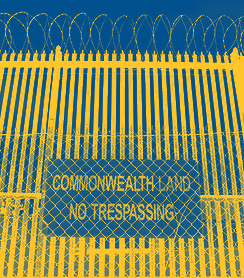Crime links in offshore contracts
 Companies behind Australia's offshore detention regime have been implicated in a complex web of suspected criminal dealings.
Companies behind Australia's offshore detention regime have been implicated in a complex web of suspected criminal dealings.
A detailed investigation by former Defence Chief Dennis Richardson has laid bare a startling lack of due diligence in the awarding of multimillion-dollar contracts to companies under scrutiny for their alleged involvement in illegal activities.
Home Affairs Minister Clare O’Neil says the previous LNP administration oversaw “an offshore processing regime being used as a slush fund by suspected criminals”.
The Richardson report's findings, despite not directly implicating ministers in wrongdoing, suggest a systemic failure in the oversight and management of contracts related to Australia's offshore detention centres.
Among the companies entangled in these allegations, MTC Australia and Paladin Group are specifically mentioned.
MTC Australia - accused of significant security failures and negligence in its operations in the United States - secured a $422 million contract for services on Nauru.
Similarly, Paladin, despite being found to have no prior expertise in the required services, obtained contracts worth over $500 million for operations on Papua New Guinea's Manus Island. Paladin’s major shareholder, Craig Thrupp, is alleged to have personally profited by an estimated $150 million. There is no suggestion Thrupp is involved in or had knowledge of any alleged crime.
The inquiry uncovered many instances where due diligence was conspicuously absent.
This includes contracts extended to individuals and entities under investigation or with proven criminal conduct, such as Mozammil Gulamabbas Bhojani, who continued to receive payments for services on Nauru even after being convicted of bribery.
The review includes the following recommendations for enhanced due diligence and intelligence sharing among government departments and agencies to prevent a recurrence of the failures.
Enhance Integrity Risk Process and Culture:
-
Improve the integrity risk process and culture, focusing on the ethical conduct of tenderers and suppliers and conducting thorough risk-informed due diligence throughout the procurement lifecycle
Foster an 'Ask and Tell' Environment:
-
Promote a culture of collaboration, proactive inquiry, and information sharing within Home Affairs, particularly concerning regional processing arrangements
Develop a Protocol for Sharing Information:
-
In collaboration with the AFP and ONI, develop a protocol for sharing law enforcement and intelligence information to inform procurement decisions in high-risk environments
The report included a fourth recommendation, but this was redacted.
Despite the acknowledgment of significant shortcomings, the report stops short of holding specific individuals or entities accountable, instead focusing on systemic reforms.
The findings raise questions about the integrity of Australia's offshore detention operations and could cast a long shadow over the government's procurement processes.








 Print
Print